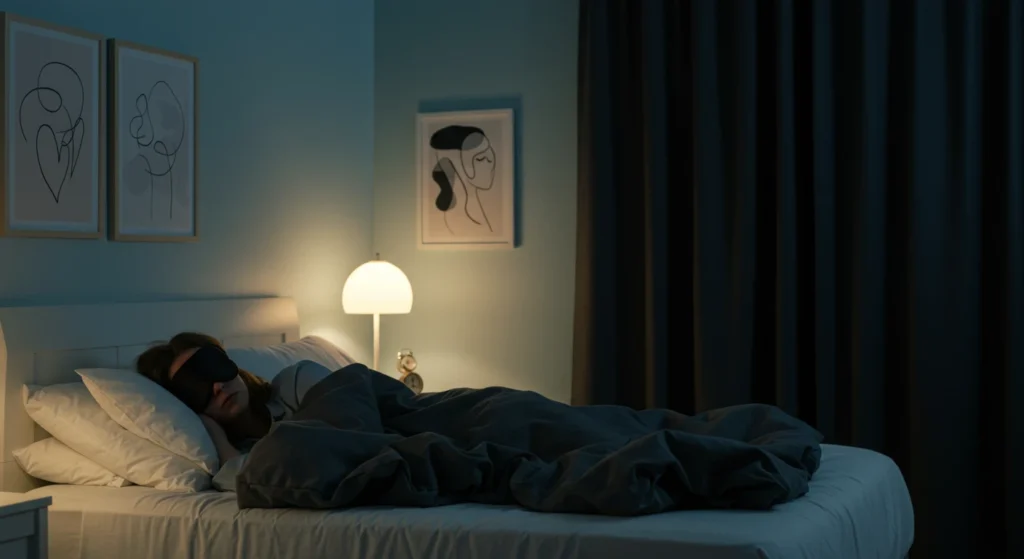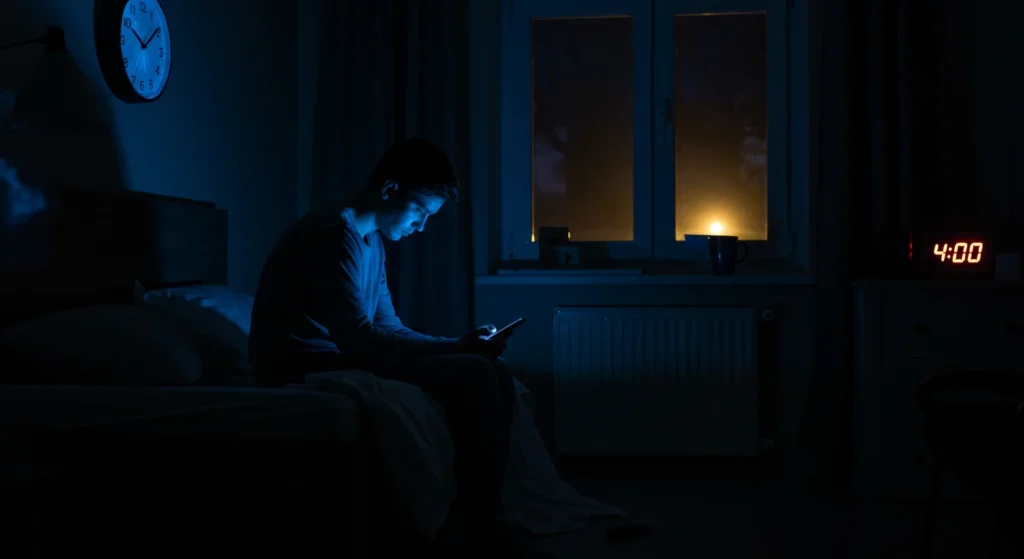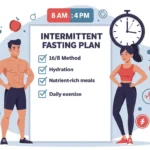Introduction
Are you tired all the time, even after a full night’s sleep? You’re not alone. Millions of people globally experience persistent fatigue, and often, the root causes are misunderstood or overlooked. A healthy lifestyle isn’t just about eating right or exercising it also includes addressing what drains your energy daily. From nutritional imbalances to poor sleep hygiene, understanding these fatigue causes can be a game-changer for your overall well-being. In this guide, we’ll explore the top 9 reasons you might be feeling drained and exactly what you can do to reclaim your energy and vitality.
Sleep Deprivation and Fatigue Causes: Why You’re Always Tired All the Time

Feeling tired all the time despite spending hours in bed? One of the most overlooked yet powerful fatigue causes is sleep deprivation. Quality sleep is not just a luxury it’s a biological necessity. Without it, your body cannot properly repair tissues, balance hormones, process memories, or support a strong immune system. In short, poor sleep habits can sabotage even the healthiest lifestyle.
A consistent lack of sleep doesn’t just lead to morning grogginess. Over time, it can cause chronic fatigue, irritability, reduced cognitive performance, and even weight gain. According to the Centers for Disease Control and Prevention (CDC), adults need 7 to 9 hours of sleep per night to maintain optimal health and function effectively throughout the day (CDC, 2022).
Unfortunately, modern routines are filled with stressors, excessive screen time, and unpredictable schedules all of which disrupt natural sleep cycles. As a result, it’s no wonder so many people feel tired all the time and struggle to maintain their energy levels.
Healthy Sleep Habits: How to Fix Sleep-Related Fatigue Causes
1. Establish a Consistent Sleep Schedule for Lasting Energy Boost
Staying up late on weekends and sleeping in may feel good in the moment, but it confuses your internal clock. This disruption in your circadian rhythm can lead to irregular sleep patterns and ongoing tiredness.
Action Step: Go to bed and wake up at the same time every day even on weekends. This stabilizes your biological clock and improves the quality of your sleep over time.
2. Limit Screen Time Before Bed for a Healthier Lifestyle
Screens emit blue light that interferes with melatonin production, a hormone essential for sleep. Reducing screen time is one of the simplest changes you can make for a healthier lifestyle and deeper rest.
Action Step: Turn off all electronic devices at least one hour before bedtime. Instead, wind down with a book, meditation, or a warm bath to signal your body that it’s time to rest.
3. Create a Sleep-Friendly Environment to Reduce Tiredness
Your bedroom setup plays a major role in sleep quality. Factors like noise, temperature, and light can all impact how well you sleep.
Action Step: Make your bedroom cool, dark, and quiet. Use blackout curtains, keep electronics out of the room, and consider white noise machines or earplugs if you’re sensitive to sounds.
4. Additional Tips for a Healthy Sleep-Boosting Lifestyle
- Avoid caffeine after 2 PM to reduce nighttime restlessness.
- Exercise regularly, but not too close to bedtime.
- Keep your bedroom clean and clutter-free to promote calmness.
- Avoid heavy meals right before sleep, as digestion can interfere with rest.
Fatigue Causes and Poor Nutrition: Why You’re Tired All the Time

Have you ever felt tired all the time even after a full night’s rest? You might be overlooking one of the most common fatigue causes: your diet. Poor nutrition, specifically nutrient deficiencies, can significantly affect your energy levels and overall sense of well-being. Without the right balance of vitamins and minerals, your body struggles to function efficiently, leaving you physically drained and mentally foggy.
Adopting a healthy lifestyle doesn’t only mean cutting calories or avoiding sugar it’s about nourishing your body with the right foods that support long-term vitality. Essential nutrients like iron, vitamin D, and vitamin B12 are key players in maintaining energy, cognitive performance, and immune function. When these nutrients are lacking, chronic fatigue becomes a silent yet persistent problem.
In fact, according to the National Institutes of Health (NIH), vitamin B12 deficiency can lead to extreme tiredness, weakness, and even neurological issues if left untreated (NIH, 2021).
Energy Boost from the Inside Out: How Poor Diet Impacts a Healthy Lifestyle
1. Nutrient Deficiencies as Fatigue Causes That Are Often Missed
Your body needs a consistent supply of nutrients to convert food into usable energy. When key vitamins or minerals are missing, the energy conversion process slows down, leading to feelings of being constantly tired.
Common deficiencies that cause fatigue include:
- Iron: Low levels reduce oxygen delivery to tissues, making you feel sluggish.
- Vitamin B12: Essential for red blood cell formation and nervous system health.
- Vitamin D: Plays a role in mood regulation and muscle function.
- Magnesium: Important for muscle recovery and steady energy release.
Action Step: Get comprehensive blood work to evaluate your current nutrient levels. Many deficiencies, especially B12 and vitamin D, often go undetected until symptoms worsen.
2. Eating for Energy: Nutrient-Dense Foods for a Healthier Lifestyle
Making small yet intentional changes to your diet can lead to substantial improvements in energy and mood. Whole, nutrient-rich foods provide the vitamins and minerals your body needs to function at its best.
Incorporate the following into your daily routine:
- Leafy greens (spinach, kale) for iron and folate
- Lean proteins (salmon, eggs, legumes) for B vitamins
- Whole grains (quinoa, brown rice) for long-lasting energy
- Colorful vegetables for antioxidants and fiber
Action Step: Fill your plate with a variety of colors and textures. A diverse diet not only boosts energy but also enhances digestion and immune strength.
3. Consider Targeted Supplements with Professional Guidance
While food should always be your first source of nutrients, sometimes supplements are necessary especially if you’re diagnosed with a deficiency.
Action Step: Only take supplements after consulting with a healthcare provider. Over-supplementing certain vitamins can be harmful and may cause more fatigue or other health issues.
Reclaim Your Energy and Embrace a Truly Healthy Lifestyle
If you find yourself feeling tired all the time, it may be time to look closely at your plate. What you eat or don’t eat has a direct impact on how your body feels and functions. By addressing nutrient deficiencies and prioritizing energy-boosting, whole foods, you’ll not only feel more energized but also improve your lifestyle in every aspect, from mental clarity to emotional balance.
Eating right is more than just staying full it’s the foundation of vibrant living.
Fatigue Causes and Chronic Stress: Why You’re Always Tired All the Time

Are you constantly feeling tired all the time, even after a good night’s sleep? One of the most overlooked fatigue causes is chronic stress and anxiety. In today’s fast-paced world, mental strain often goes unaddressed until it manifests physically. And that’s exactly what stress does it drains your energy, compromises your immune system, and disrupts the delicate balance your body needs to thrive.
When you’re under chronic stress, your body remains in a prolonged “fight-or-flight” mode. This state leads to an overproduction of cortisol and adrenaline hormones meant for short bursts of emergency energy. However, when produced continuously, they end up exhausting both your mind and body.
According to the American Psychological Association, long-term stress is linked to fatigue, headaches, sleep disturbances, and difficulty concentrating—major red flags for a compromised healthy lifestyle (APA, 2021).
The Connection Between Mental Stress and Physical Fatigue
1. Why Chronic Stress is One of the Top Fatigue Causes That Leaves You Tired All the Time
Unlike physical exertion, mental stress is a silent energy thief. It drains your cognitive resources, affects your decision-making abilities, and depletes your emotional bandwidth. Over time, stress-induced fatigue can also cause inflammation and hormonal imbalances that further weaken your body’s ability to recover.
Action Step: Recognize early signs of chronic stress like irritability, constant worrying, low motivation, and poor concentration. Acknowledging the problem is the first step to reclaiming your energy.
2. Daily Mindfulness: A Simple, Healthy Lifestyle Habit for Lasting Energy Boost
Mindfulness and meditation are powerful tools to interrupt the stress cycle. These practices lower cortisol levels, promote emotional balance, and help you reconnect with the present moment boosting your energy from the inside out.
Action Step: Set aside just 10–15 minutes each morning to practice deep breathing, mindfulness, or guided meditation. Consistency is key to reaping long-term benefits.
3. Cut Back on Stimulants: Reduce Caffeine and Alcohol for Better Energy Balance
Although caffeine provides a short-term energy boost, excessive consumption can increase anxiety and worsen sleep quality ironically making you feel more tired. Alcohol, often used to unwind, also disrupts sleep cycles and contributes to fatigue.
Action Step: Gradually reduce caffeine intake and avoid alcohol in the evenings. Opt for herbal teas like chamomile or rooibos that naturally calm your nervous system.
4. Therapy and Emotional Support: A Core Part of a Healthy Lifestyle
Sometimes, professional support is essential. Therapy or counseling can help you develop healthy coping mechanisms, reframe negative thinking, and manage stress more effectively.
Action Step: Don’t hesitate to seek help. A therapist can offer tools and strategies that are specifically tailored to your situation, making a lasting difference in your energy levels and emotional resilience.
Final Thoughts: Fight Fatigue with a Healthier, More Mindful Lifestyle
Chronic stress is more than just a mental burden it’s one of the most dangerous fatigue causes keeping you tired all the time. But the solution doesn’t need to be complicated. With consistent mindfulness, conscious lifestyle choices, and professional guidance when necessary, you can regain control over your energy and wellbeing.
Managing stress is not about avoiding challenges, but about equipping yourself to handle them with clarity, calmness, and vitality. That’s the true power of a healthy lifestyle.
Fatigue Causes and Dehydration: Why You’re Always Tired All the Time

Have you ever felt inexplicably tired all the time despite eating well and sleeping adequately? One of the most underestimated fatigue causes is dehydration. While it might seem like a minor issue, even mild dehydration can significantly impact your physical energy, mental clarity, and overall ability to function throughout the day.
Water plays a vital role in almost every bodily process. In fact, your body is composed of approximately 60% water, and each cell, tissue, and organ depends on proper hydration to operate efficiently. When fluid levels drop even slightly, it creates a ripple effect impacting circulation, digestion, metabolism, and brain function.
According to the Mayo Clinic, inadequate hydration can lead to fatigue, dizziness, headaches, and decreased alertness symptoms that are often misattributed to other causes (Mayo Clinic, 2021).
Tired All the Time? Here’s Why Dehydration Might Be the Energy Drain You Didn’t Expect
1. How Dehydration Affects a Healthy Lifestyle and Daily Energy Boost
Hydration is not just about quenching thirst it’s essential to maintaining a healthy lifestyle. When dehydrated, your blood volume decreases, which means your heart has to work harder to pump oxygen and nutrients to your muscles and brain. This results in low energy, reduced concentration, and a constant feeling of being tired or drained.
Furthermore, dehydration can mimic symptoms of fatigue-related disorders, making it a silent energy thief that’s often ignored in the pursuit of better health.
Action Step: Recognize subtle signs of dehydration such as dry mouth, dark-colored urine, irritability, or trouble focusing. Don’t wait until you’re thirsty—by then, you’re already dehydrated.
2. Practical Ways to Stay Hydrated and Avoid Fatigue
Thankfully, preventing dehydration is simple. Making hydration a daily habit can dramatically improve your energy levels and overall wellbeing.
Hydration Tips for an Energy Boost:
- Drink at least 8 glasses (2 liters) of water each day—or more if you exercise or live in a hot climate.
- Monitor your urine color: Pale yellow is a sign of proper hydration.
- Eat hydrating foods: Water-rich fruits and vegetables like cucumbers, watermelon, oranges, and celery are great additions to your diet.
- Use a reusable water bottle and keep it with you throughout the day as a visual reminder.
Action Step: Set phone reminders or use a hydration tracking app to build a consistent water-drinking habit, especially during your busiest hours.
3. Hydration and Mood: A Lesser-Known Link to Fatigue Causes
Not only does dehydration sap your energy, but it can also alter your mood and cognitive performance. Research has shown that even mild fluid loss (around 1–2% of body weight) can lead to increased feelings of anxiety, tension, and fatigue.
Action Step: Start your morning with a glass of water before coffee or tea, and stay hydrated steadily throughout the day rather than gulping large amounts at once.
Final Thoughts: Hydration is the Simplest Way to Avoid Feeling Tired All the Time
If you’re looking for a natural energy boost, don’t underestimate the power of water. Staying hydrated supports a wide range of bodily functions and is one of the easiest ways to maintain a healthy lifestyle. Instead of reaching for another coffee, try reaching for a glass of water your body and brain will thank you.
Fatigue Causes and Inactivity: Why You’re Always Tired All the Time

Do you feel tired all the time, even on days when you barely move? Ironically, not moving enough can be one of the primary fatigue causes. A sedentary lifestyle may seem restful, but in reality, it deprives your body of the natural energy boost that comes from regular movement.
Contrary to what many believe, the more you rest inactively, the more likely you are to feel sluggish and tired. Without movement, circulation slows, oxygen delivery decreases, and your muscles weaken. Over time, this lack of activity can impact your mood, disrupt your metabolism, and throw your entire healthy lifestyle off balance.
According to the World Health Organization (WHO), physical inactivity is one of the leading risk factors for global mortality and is a key contributor to fatigue, anxiety, and poor mental health (WHO, 2020).
How Inactivity Sabotages Your Healthy Lifestyle and Keeps You Tired All the Time
1. The Hidden Effects of a Sedentary Routine on Your Body and Energy Levels
Sitting for prolonged periods whether at work, in the car, or on the couch can seriously diminish your body’s energy production. With reduced circulation, your brain and muscles receive less oxygen, making it harder to stay alert and focused. In addition, endorphins (your body’s natural “feel-good” chemicals) are released during movement, and without them, mental fatigue sets in quickly.
Action Step: If your job is sedentary, set a timer to stand or stretch for five minutes every hour. Even short bursts of movement can make a significant difference.
2. Simple Ways to Add Movement to Your Day for an Immediate Energy Boost
Getting more exercise doesn’t mean hours at the gym. In fact, moderate activity—as simple as a brisk walk or a light yoga session—can deliver profound health benefits and improve energy.
Tips for an Active, Healthy Lifestyle:
- Aim for 30 minutes of moderate exercise, like brisk walking or cycling, five days a week.
- Add mini workouts: take the stairs, stretch while watching TV, or dance during house chores.
- Try low-impact yet energizing activities like yoga, tai chi, or dancing, which also boost mood and reduce stress.
Action Step: Choose an activity you enjoy so you’re more likely to stick with it. Consistency matters more than intensity.
3. Physical Activity and Fatigue: The Energy Connection Explained
It may feel counterintuitive, but moving more actually gives you more energy. Exercise increases mitochondrial density (your cells’ energy factories), improves sleep quality, and enhances insulin sensitivity allowing your body to convert food into usable energy more efficiently.
Plus, when you move regularly, your posture, digestion, and even hydration habits often improve naturally, leading to a more vibrant, healthy lifestyle.
Final Thoughts: Movement is Medicine for Fatigue
If you’re feeling tired all the time, your body may not need more rest it may need more movement. By gradually increasing your physical activity, you’ll not only combat one of the top fatigue causes, but also experience better sleep, mood, and mental clarity.
Reignite your energy with regular movement. Whether it’s walking through nature, stretching at your desk, or dancing in your living room, remember: motion is life and your energy depends on it.
Fatigue Causes and Medical Conditions: Why You’re Tired All the Time

If you feel tired all the time, despite getting enough rest, eating well, and staying active, it may be time to consider an underlying medical condition as one of the hidden fatigue causes. While it’s easy to blame lifestyle factors, many serious health issues can manifest primarily as chronic fatigue or low energy.
From hypothyroidism and sleep apnea to anemia and type 2 diabetes, countless medical conditions list persistent tiredness as a key symptom. In fact, fatigue is one of the most common reasons people seek medical care.
Healthy Lifestyle Check: When Fatigue Persists Despite Your Best Efforts
1. Common Medical Conditions That Cause Fatigue
Several chronic illnesses can silently disrupt your energy levels, even before other symptoms appear:
- Hypothyroidism: A sluggish thyroid slows down metabolism, leading to constant fatigue, weight gain, and cold sensitivity.
- Anemia: A lack of red blood cells reduces oxygen delivery to muscles and organs, resulting in weakness and exhaustion.
- Sleep Apnea: Interrupted breathing during sleep causes poor-quality rest and morning fatigue.
- Type 2 Diabetes: Poor blood sugar regulation affects how your body uses energy, leaving you feeling tired even after a full meal.
Action Step: If your fatigue is accompanied by symptoms like weight changes, hair loss, brain fog, or headaches, it’s important to discuss this with your doctor.
2. Why Diagnosing Medical Fatigue Causes is Essential for a Healthy Lifestyle
Ignoring medical warning signs can lead to serious consequences. While it’s tempting to power through tiredness with caffeine or short naps, unresolved conditions can worsen over time, leading to poor immune function, mental health issues, and even organ damage.
Getting a proper diagnosis allows you to treat the root cause instead of just managing the symptoms. Often, once a condition like iron-deficiency anemia or thyroid dysfunction is treated, patients report a dramatic energy boost and improved quality of life.
Action Step: Ask your healthcare provider for a full blood panel, including thyroid function, iron levels, B12, and glucose, especially if you’ve experienced fatigue for more than two weeks.
3. Long-Term Fatigue Relief Through Medical Care and Lifestyle Support
Once a diagnosis is made, it’s important to follow your treatment plan closely. This may include medications, dietary adjustments, or use of devices like a CPAP machine for sleep apnea. Additionally, pairing medical care with a healthy lifestyle such as balanced nutrition, regular movement, and hydration amplifies recovery.
Pro Tip: Keep a fatigue journal to track your energy patterns, sleep quality, and food intake. This can help you and your doctor pinpoint fatigue triggers more effectively.
Final Thoughts: Don’t Ignore Tiredness Your, Health Depends on It
While fatigue can stem from simple lifestyle oversights, persistent tiredness is never something to take lightly. Sometimes, the body is sending signals that something deeper is going on. When addressed promptly, medical fatigue causes can often be managed or even reversed leading to lasting energy boosts and a more vibrant, healthy lifestyle.
Take charge of your energy. If lifestyle tweaks haven’t helped, consult a healthcare provider. Your energy is a reflection of your inner health don’t let hidden conditions steal it.
Tired All the Time? Caffeine Dependency Might Be One of the Top Fatigue Causes

Many people start their day with a hot cup of coffee, relying on that quick energy boost to jumpstart their productivity. While caffeine can temporarily improve alertness, overreliance often results in more harm than help especially for those feeling tired all the time.
In the short term, caffeine blocks adenosine receptors in the brain, making you feel less drowsy. However, as your tolerance builds, you need more caffeine to get the same effect, leading to a vicious cycle of dependency and energy crashes later in the day. These highs and lows can seriously disrupt your healthy lifestyle, contributing to chronic fatigue over time.
Fatigue Causes You Didn’t Expect: How Caffeine Can Make You More Tired
1. The Illusion of Energy
Although caffeine feels like a solution, it only masks tiredness without actually providing real energy. After the stimulating effect wears off, the suppressed adenosine floods your system, making you feel even more exhausted than before. This rollercoaster effect can lead to inconsistent energy levels throughout the day.
Furthermore, consuming too much caffeine especially in the afternoon can significantly disrupt sleep quality, making it one of the indirect but powerful fatigue causes.
Pro Tip: If you’re waking up tired despite sleeping 7–9 hours, your late-day caffeine habits may be to blame.
2. A Healthy Lifestyle Means Balanced Energy, Not Dependency
To truly boost energy and maintain a sustainable, healthy lifestyle, it’s essential to moderate caffeine intake and replace it with better alternatives. Here’s how to shift from temporary energy fixes to lasting vitality:
- Limit caffeine consumption to no more than 200–400 mg per day (roughly 1–2 cups of coffee).
- Avoid caffeine after 2 PM to preserve your natural circadian rhythm and improve sleep.
- Replace your afternoon coffee with herbal teas like chamomile, rooibos, or peppermint, which support relaxation and hydration.
- Stay hydrated mild dehydration often mimics fatigue and is easily mistaken for the need for another coffee.
Expert Insight: Dr. Uma Naidoo, a nutritional psychiatrist from Harvard, emphasizes that “Caffeine can temporarily sharpen attention, but over time, it may lead to disrupted sleep patterns and anxiety, both of which increase fatigue” (Harvard Health Blog, 2020).
3. Breaking Free from Caffeine for a Natural Energy Boost
Reducing caffeine doesn’t mean you’ll feel sluggish forever. In fact, after a short adjustment period, most people report steadier energy levels, improved sleep, better hydration, and enhanced mental clarity. This shift supports long-term wellness and fits seamlessly into any healthy lifestyle.
If quitting cold turkey feels daunting, try a gradual reduction approach. Mix half-decaf with regular coffee, cut back by one cup per week, or swap to green tea, which has lower caffeine content but provides antioxidants.
Tired All the Time? Mental Health Issues May Be One of the Most Overlooked Fatigue Causes

When we talk about being tired all the time, most people immediately think of physical exhaustion. But what often goes unnoticed are the mental health factors contributing to constant fatigue. In fact, mental exhaustion can be just as draining if not more than physical tiredness.
Depression, anxiety, and emotional burnout are significant yet frequently ignored fatigue causes. These conditions affect neurotransmitters like serotonin and dopamine, disrupting your brain’s ability to regulate mood, energy, and motivation. Consequently, even if you’re sleeping enough or eating well, you may still feel persistently tired, overwhelmed, or emotionally numb.
According to the World Health Organization (WHO), depression is one of the leading causes of disability worldwide, and chronic fatigue is among its most common symptoms (WHO, 2021).
Understanding the Link Between Mental Health and Chronic Fatigue
1. Emotional Burnout: When Stress Doesn’t Let Up
Burnout is a state of prolonged emotional, physical, and mental exhaustion, usually caused by long-term stress or overwhelming demands. It’s common among caregivers, professionals, students, and even parents. Over time, the nervous system becomes overstimulated, leading to sleep disturbances, low energy, and constant feelings of being tired.
Symptoms of burnout include:
- Chronic fatigue
- Feelings of detachment or helplessness
- Irritability or mood swings
- Difficulty concentrating
These indicators often overlap with depression, making it crucial to seek a proper diagnosis and support.
2. Depression: A Fatigue Cause That’s More Than Just Sadness
Depression isn’t just about feeling sad it’s a complex mental health condition that often presents itself as a deep, persistent tiredness. It makes even the simplest tasks, like getting out of bed or brushing your teeth, feel monumental.
Depression-related fatigue typically includes:
- Sleep issues (either insomnia or oversleeping)
- Loss of interest in activities
- Feelings of worthlessness or guilt
- Reduced physical and cognitive function
These symptoms can severely impact your healthy lifestyle, making it harder to maintain routines that typically provide an energy boost, like exercising, socializing, or eating well.
How to Fix It: Healthy Lifestyle Strategies for Mental Fatigue
Fortunately, there are effective ways to address these emotional energy drains and reclaim your vitality:
Prioritize Professional Support
If you suspect that depression or burnout is making you tired all the time, the first step is to reach out to a mental health professional. Therapy, counseling, or even medication (when prescribed by a licensed provider) can significantly improve both mental health and energy levels.
Embrace Self-Care Rituals
Self-care isn’t indulgent it’s essential. Even small actions like taking a walk, drinking tea while reading, or journaling your thoughts can help regulate your emotions and support healing.
- Journaling: Writing about your thoughts and feelings has been shown to reduce stress and improve emotional clarity.
- Creative expression: Art, music, or crafting can provide a therapeutic outlet and lift your mood.
- Connection: Spending time with loved ones even virtually can combat loneliness and restore your sense of belonging.
Improve Your Sleep Hygiene and Lifestyle Habits
Although depression can make sleep difficult, adopting better sleep hygiene can gradually help restore a healthier circadian rhythm. Go to bed at the same time every night, avoid screens an hour before sleep, and keep your sleep environment calm and dark.
Additionally, include physical activity in your routine even light exercise has been shown to reduce symptoms of depression and enhance your natural energy boost.
Final Thoughts: Don’t Ignore Emotional Fatigue
If you’re tired all the time despite living a seemingly balanced life, it’s essential to look inward. Mental health plays a pivotal role in your energy levels and overall healthy lifestyle. Recognizing the signs of depression and emotional burnout is the first step to healing.
Prioritize your mental well-being just as much as your physical health. Seek help, stay connected, and make space for self-expression you deserve to feel energized, motivated, and alive again.
Tired All the Time? Disrupted Circadian Rhythm Could Be a Major Fatigue Cause

One of the most common yet overlooked reasons for feeling tired all the time is a disrupted circadian rhythm your body’s natural internal clock that regulates sleep-wake cycles. Even without traveling across time zones, lifestyle factors such as irregular sleep schedules, night shift work, or excessive exposure to artificial light can cause your circadian rhythm to become misaligned. This misalignment leads to poor sleep quality, reduced alertness, and chronic fatigue, which interfere directly with maintaining a healthy lifestyle.
The circadian rhythm governs when you feel sleepy or alert by controlling hormone release, including melatonin, which signals your body to prepare for sleep. When this rhythm is thrown off balance, it’s like experiencing constant jet lag, making you feel drained regardless of how many hours you spend in bed.
Fatigue Causes: What Disrupts Your Circadian Rhythm?
1. Irregular Sleep Times and Shift Work
Working night shifts or rotating schedules forces your body to stay awake when it naturally wants to sleep and vice versa. This conflict between your work hours and biological clock is a prime culprit behind feeling tired throughout the day.
Moreover, inconsistent bedtimes even on weekends can confuse your internal clock. This irregularity makes falling asleep or waking up difficult, thus worsening daytime fatigue and diminishing your natural energy boost.
2. Exposure to Artificial Light and Blue Light Pollution
In the digital age, exposure to screens emitting blue light (phones, computers, TVs) has skyrocketed. Blue light suppresses melatonin production, delaying the onset of sleep and fragmenting rest.
Additionally, urban environments with excessive nighttime lighting disrupt the natural darkness that your brain needs to initiate restorative sleep cycles. Both effects directly impact your circadian rhythm and overall energy.
How to Fix Disrupted Circadian Rhythm for a Healthy Lifestyle and Sustained Energy Boost
Establish Consistent Sleep and Wake Times
One of the most effective ways to realign your circadian rhythm is to wake up and go to bed at the same time every day yes, even on weekends. This regularity helps your brain anticipate sleep and alertness periods, promoting deeper, more restorative sleep.
Get Morning Sunlight Exposure
Natural light is a powerful cue to reset your internal clock. Spending at least 15–30 minutes outside in the morning sunlight can help suppress melatonin and signal your body that it’s time to be alert and awake.
Even opening your curtains immediately after waking, as simple as it sounds, can make a significant difference in resetting your rhythm.
Limit Blue Light Exposure in the Evening
To protect your melatonin production, avoid screens for at least one hour before bedtime. If this isn’t possible, consider using blue light-blocking glasses or screen filters that reduce the impact on your circadian rhythm.
Create a calming pre-sleep routine with dim lights and relaxing activities like reading a physical book, gentle stretching, or meditation.
Expert Insight on Circadian Rhythm and Fatigue
Dr. Charles Czeisler, a leading sleep researcher at Harvard Medical School, explains, “Circadian rhythm disruption is a fundamental cause of many chronic health problems, including fatigue, mood disorders, and metabolic issues. Resetting your body clock is crucial for energy regulation and overall wellness” (Harvard Medical School, 2020).
Final Thoughts: Reset Your Internal Clock to Beat Fatigue
If you constantly feel tired all the time, your circadian rhythm could be out of sync, silently sabotaging your efforts to maintain a healthy lifestyle and achieve an energy boost. The good news is that with consistent habits like morning sunlight exposure, regular sleep schedules, and limiting blue light at night, you can reset your body’s clock and reclaim your natural vitality.
Your Path to a Healthy, Energized Lifestyle
Being tired all the time doesn’t have to be your normal. By addressing these common fatigue causes, you can regain control over your energy and start living the healthy lifestyle you deserve. It’s time to prioritize your well-being, make conscious changes, and embrace a vibrant, energized life.
AI Image Prompt: A smiling person walking confidently in nature with the sun shining, arms open wide, symbolizing renewed energy and happiness.






